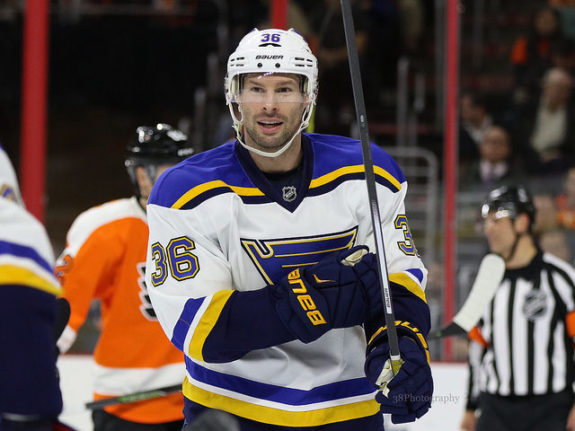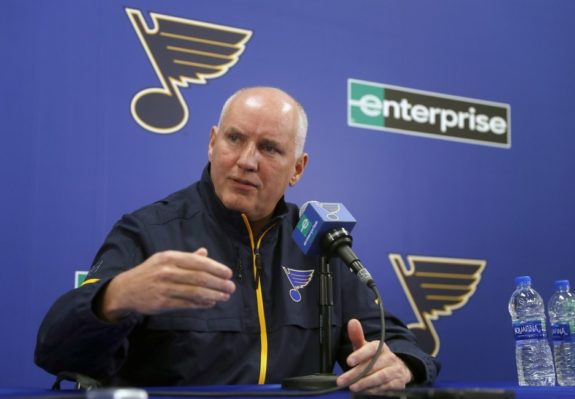St. Louis Blues forward Troy Brouwer just cleared waivers, further signaling the inevitable end of a championship-winning career.
Blues Deal Oshie for Brouwer
Brouwer had signed a one-year deal back in November to rejoin the Blues after a professional try-out. The rugged forward had served as a risk-free addition, but that wasn’t always the case. Back in the summer of 2015, Blues general manager Doug Armstrong acquired him the first time around in a trade with the Washington Capitals (with backup goalie Pheonix Copley and a third-round pick that would become Garrett Pilon) for T.J. Oshie.

It would be an understatement to say the Blues gave up more than they got in the deal. Nevertheless, it arguably worked out for both sides, just for vastly different reasons.
At the time, some analysts actually saw the trade as a potential loss for the Caps. They were giving up much-needed grit and size in favor of skill. Like with any trade there was undeniable risk involved, but it was probably more so for the Blues in all actuality.
Oshie vs. Brouwer
The Blue were instead giving up a younger player in Oshie who also had two seasons left under contract. The Blues were meanwhile gaining a 30-year-old whose best years were logically behind him. The fact that Brouwer had only one season under contract at that point, while ultimately for the best, had to be seen as another drawback at the time.

In that sense, the trade was probably seen as a calculated move by Armstrong. Obviously, Oshie was the player with the higher ceiling, with Brouwer topping out at 43 points (Oshie was and still is a 60-point threat, albeit an inconsistent one). Nevertheless, the Blues had failed to win a single game in the second round in literally 13 years. Changes were necessary.
While Armstrong likely failed to foresee Oshie becoming a 30-goal-scorer with the Caps, Brouwer delivered production in line with expectations. He notched 18 goals and 21 assists that 2015-16 season, as well as 13 points in 20 playoff games the following spring as the Blues reached Round 3 for the first time since 2001.
As a result, the deal has to have been considered a success for the Blues. Other teams have given up similar hauls at the trade deadline for rentals, without getting nearly as far in the playoffs. Brouwer was just their rental. The only difference is the Blues got an entire season out of him instead of just a few months.
Blues and Capitals Both Win
It maybe wasn’t a success to the same degree it has been from the perspective of the Capitals, admittedly. After all, Oshie is still a member of the Caps, with whom he won a Cup in 2018. They also coincidentally got the rights to Copley and Pilon back in separate deals. Nevertheless, considering the Blues won it all a year later, it’s hard to feel too bad for them, even if they lost Brouwer after just the one season.
In fact, considering the sharp decline in Brouwer’s production since his one season with the Blues, it’s probably for the best. He signed a four-year, $18 million deal with the Calgary Flames on July 1, 2016 only to go from 40 points a season to 20. That deal got bought out in 2018, at which point Brouwer signed a one-year deal with the Panthers on the cheap, which brings us to the point at which he re-joined the Blues.
The fact that Armstrong signed Brouwer back in November proves the he had been happy with how things went back in 2015-16. It obviously isn’t working out as well this time around, as Brouwer has a single goal in 13 games as a frequent healthy scratch, begging the question: would they prefer to have Oshie?

Superficially speaking, sure. Oshie continues to produce with the Caps. Furthermore, his $5.75 million cap hit is more than worthwhile. That’s where the positives stop outweighing the negatives, though. The deal Oshie signed with the Caps to stay on back in 2017 was for eight years and comes complete with a modified no-trade clause. It expires when Oshie will be 38 years old, at which point that hit won’t be nearly as attractive. It’s fair to assume the Blues would have had to offer him something similar or lose him to free agency altogether.
Seeing as the Blues are in a less-than-enviable salary-cap position, it’s all effectively moot. Had the Blues kept Oshie in the fold instead of trading him away, they may not have felt comfortable acquiring Ryan O’Reilly and his $7.5 million hit. They likely don’t get back David Perron, who’s actually outscored Oshie over the last two seasons as a Blue, even on his current sweetheart four-year, $16 million deal. There just wouldn’t have been space to under the cap or on the roster. Fans may even be bracing for the impending departure of defenseman Alex Pietrangelo instead of assuming Armstrong somehow re-signs him.
To be clear, the Capitals didn’t lose the trade. It’s just a deal in which the Blues got the worse return but still ended up as winners themselves. Brouwer served his purpose in the short term. He may not have been a part of the team that won the Cup a few seasons later, but the ramifications of the deal undeniably helped shape the championship-winning squad. So, it’s not a deal to be regretted, but rather celebrated, much like Brouwer, even in his limited role as his time with the Blues nears its end.